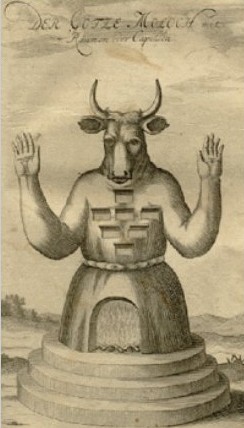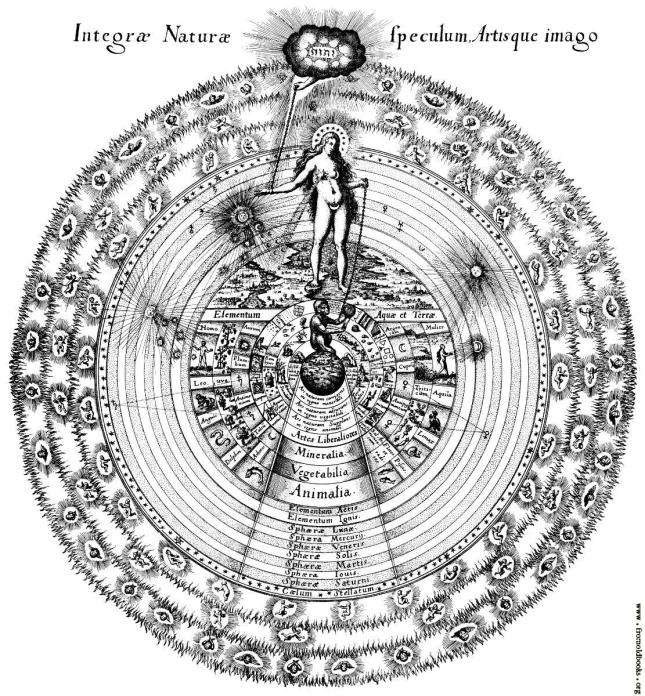 Astute readers will have noticed that the far bulk of our work here has been concerned with elaborating and investigating the fight between Creation and Evolution. Our search has been for the origin of Man, and these two ideas are the basis for most, if not all the philosophy and science concerning this origin. We have considered them each individually, weighing their claims against the facts the best we could, we have discussed their methods and presumptions, studied their histories, and even considered some hybrid theories which have attempted to reconcile these two apparently opposing points of view.
Astute readers will have noticed that the far bulk of our work here has been concerned with elaborating and investigating the fight between Creation and Evolution. Our search has been for the origin of Man, and these two ideas are the basis for most, if not all the philosophy and science concerning this origin. We have considered them each individually, weighing their claims against the facts the best we could, we have discussed their methods and presumptions, studied their histories, and even considered some hybrid theories which have attempted to reconcile these two apparently opposing points of view.
Classically, this debate is really one centered around theism versus atheism, in other words, God versus No God. What Man is and what he can be, as well as what he will become, is handled differently by theorists depending, more often than not, on their standing on this God question. In the main, atheists prefer Evolution and the Big Bang, while of course theists of all kinds prefer Creation. Recent religious thinkers have taken things further, and accepted evolutionary elements into Creation, and modern scientific thinkers have likewise buckled under and admitted mystical or spiritual concepts into their Evolution. What becomes clear, considering the historical development, is that what God is – and what the concept “God” can mean – has a direct bearing on the theory offered by the theorist.
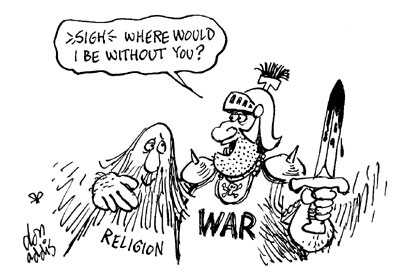
Today, and all through history, God is, and has been, represented differently, usually according to, and depending upon, where in the world one lives. Furthermore, in art, in culture, in academia, in language, as well as in religions and churches, God can and does mean many different things. The resulting chasms of discrepancy regarding The Almighty are arguably the main reasons for most cultural disagreement and hostility throughout this known history, an inanity which continues to this day. The fighting now not only occurs among atheists, theists, and agnostics, but the hostilities have also been extended to separate sects within each individual faith. So, for example, Roman Catholics argue with Eastern Orthodox Catholics, Baptists tangle with Lutherans, Sunni Muslims disagree with Shi’a Muslims, Mahayana Buddhists conflict with Hinayana Buddhists, orthodox Jews debate Kabbalah-based Judaisms, and so on. Considering the underlying nature of all religions any sane person must come to the conclusion that this behavior is absurd.
I suggest that the main reason for all this continued conflict, apart from, of course, regional bias and similar nepotism, cronyisms, and prejudices of place, is because people no longer know God intimately. I don’t allude to this “intimacy” as some sort of immaterial contact or spiritual mumbo-jumbo, or even as a “heartfelt” kind of emotion. What I mean is that their information about God comes from only these outside, conflicting, and often ridiculous and/or hypocritical sources. What most people know of their Creator comes from indoctrination received, through the religion of their family, and the immediate culture of their upbringing. As a result, like playing in the third person a religious game meant to be first person, and instead of being something internal and spiritual, embracing and professing doctrines universal and inclusive, “religion” has become an outward, even showy, often critical enterprise, consisting of an overriding and decidedly nonreligious mentality of “us” versus “them”. Under this system God is not really impartial and for all, as He should be and is, but rather, given this type of usage, He becomes a weapon for enforcing compliance, a tool for patriarchal control.
In truth, God is very real, singular, and universal. What passes as “organized religion” is, at best, a congregation of people with like ideas regarding what God might be or might want. At worst, religions are brainwashing schemes that rely on all sorts of tales and fables carefully refined over the ages to best distort the mind and direct the actions of their adherents. At best, all religions contain within them true insights and universal moralities. At worst, it may be said simply that all religions are wrong.
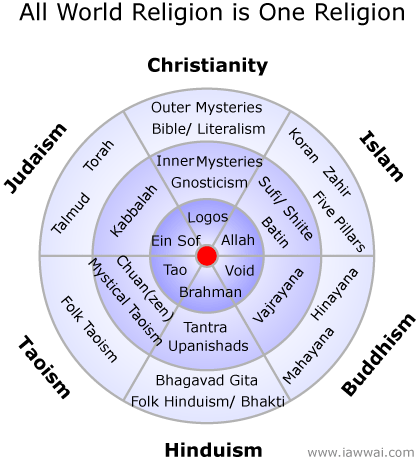
Briefly, here are some things to know about the real God, as I see it:
1. God knows everything and is everywhere (omniscience and omnipresence). You cannot hide and your are never alone.
2. There is no need to pray except for giving thanks. See #1.
3. God doesn’t prefer one “type” of people to another. God does not condone war in his name.
4. The only evils God allows in the world are those necessary for the good (apparent evil) and those performed by man.
5. God has given Man and Man only the powers of Creation and Free Will.
6. What is right and wrong to do in this life is already known in each sane person’s heart. Laws set by man attempt to codify this knowledge in the form of law.
7. Ancient instructions such as “Hammurabi’s Code” and the “10 Commandments” can be seen as early attempts of Man, by the use of metaphor, to express or communicate this inner known morality.
8. God is the encapsulation of all possible human emotion. Your emotions are God’s emotions.
9. God is not a prude. Things like sex, altered consciousness, dancing and even naked beauty, perhaps even intoxication, are not rejected by God but, on the contrary created by him, and enjoyed similarly by him. See #8.
10. God is not a fire-breathing bestower of punishment. God is best seen as a knowing father, who might punish but in the end never do anything to eternally damn a soul He created.
I could extend this list unnecessarily, in effect creating yet another set of doctrines also vulnerable to criticism and bound to be inaccurate. The point is simply that any true God is, if nothing else, non-sectarian. As to how religious a person is, or how righteous he can be, that has nothing at all to do with attending a church or subscribing to any certain creed; it is individual, based on one’s actions.
Let’s now take a quick look at the general religious philosophical positions as classically conceived.
Atheism, Theism, And Agnosticism
These three terms are meant here to encompass every possible general position on the existence of God. They are worth explaining a bit individually.
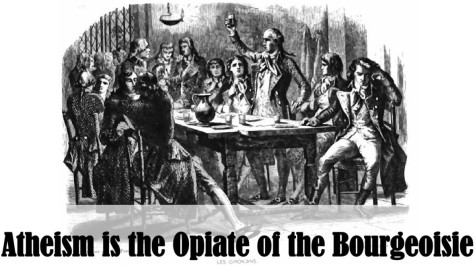
1. Atheism
Atheism, as most know, is the belief that there is no God. According to this view, Man has arisen like every other creature, through a slow process driven mostly by chance and classic evolutionary principles. No God gave the order to begin life, or orders or maintains the process, and no God exists to judge the wicked or bestow grace upon the good. Contemporary Man is here seen as a product of his parent’s genes and the force of culture, and ethics is understood on utilitarian or democratic principles (at best) or the whims of a ruler or written law (at worst). Interestingly, practicing atheists are usually very rational and often more moral than those who believe in a God, and without doubt perceived problems like hypocrisy within religion being the primary reason many of them have rejected completely any idea of God. While a true case of throwing the baby out with the bathwater, as we shall soon see, this position can also be seen as generally irrational, as “forces” and “matters” and other purely theoretical constructs are fabricated to account for discrepancies and otherwise impossibilities in the atheistic systems. Ethics here is democratic or utilitarian at base, although a “natural law” could be defended – assuming a system rejecting “god” or “God” can at the same time logically accept “Nature”, a concept at least as vague in form and ambiguous in meaning as any God. Also interestingly, depending how one looks at it, Buddhists can be considered either atheists or Deists.

2. Theism / Deism
Theism is the belief in a God that personally sees to, and in a sense guides, the life of every individual, while deism is the belief in a God who runs things but does not necessarily interfere in each and everyone’s day to day life. If theism is a philosophy or theology that God’s hand guides everything intimately, deism is the philosophy or theology that God’s hand started it all in a motion that does not necessarily require constant intervention. All Christianities, Islamists, Hindus, and Jews are such believers, and even deists like Thomas Jefferson and John Locke (and arguably, Nietzsche and Hegel…), who have more or less rejected a “personal” God, nevertheless believed in a God as the cause of all things. Even Polytheists, like the old Greeks and Romans, and to some extent the Africans and Voodoo cults, are theists, or at least deists. One can make note here that the Muslim creed, which, while it believes its own tenets the best of all, has more respect for its adversaries the Christian, and even the Jew, than for one who has no religion at all, the infidel. It becomes clear that “God” is not so much the problem as is the idea of religion, which can and does mean different things to different people.
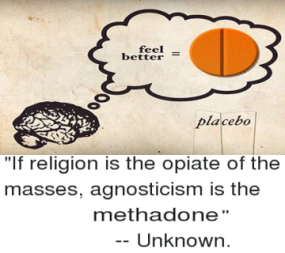
3. Agnosticism
Agnosticism is the belief that there is not enough evidence to prove God exists. Agnostics say that while the idea could be entertained in the future, should perhaps better evidence be found, God does not exist as currently defined. Apparently, for them, the fact of order in the universe, the obvious indications of a plan and design, the miracles and semi-miraculous events in their own lives, their very own creative capacities, and the meditations on the subject from some of the wisest thinkers of history, and all the rest, qualifies as “no good evidence”. It is, quite literally, a compromise position, held mostly by those who would rather not believe, but who want to cover their asses just in case He does exist. Philosophically it is a weak position, one could argue it is not really a position at all. It is the ideological equivalent of sticking your head in the sand.
The meaning of God and the meaning of religion are thus two important definitions to establish. What is undeniably true is that while all of these theories have among their numbers “good people”, that is, while each of these positions has good people who believe in them, there are many believers, from all three alike, who are not good people at all. Let’s try to define our terms then, best we can, so that we can all be on the same page.
God
God, as we should understand the Creator, is singular, and there is only one for everybody in the world. This God does not prefer white over black or black over yellow or yellow over red. This God is one but many, as being God He can and often does multiply himself, change His gender, perhaps even His destinies. He can be both male and female, and be many places at once. His justice is equally distributed to all, He has no favorites in any war, nor does he have a favorite son or child onto whom he bestows greater gifts. He is a fair father, and treats all his children equally. He is white, and black, and every color in between, he is all human colors, indeed, the creator of color. He is also an emotional being, feels rage as well as love, and these predilections are reflected in his creations. He likes it all and He likes variety, hence it all is as it is.
Most problems with the idea of God begin because some group or ruler manipulates this God-idea to gain and maintain power, and so to earn the respect and influence of the group or community. This in turn causes other groups to take exception, and reject that God, or create one of their own. Sometimes, as we have noted, these schisms even occur among those in the same group or community. What they all do not know, or seem to forget, is that there is just one God, and that their problems are not with God but with those who manipulate this God idea. In short, most problems with the idea of God come NOT from being against God, per se, but rather they are found in what God is said to desire, they are found in the human explication of God’s plan.

Let us say it is presumed that God is said to despise abortion, for example. If someone is getting or has gotten an abortion, an inevitable rejection of God comes, or must be entertained, because of the disagreement with what God is said to desire, in this case, no abortions. If and when the church ever says “abortions are OK”, then many who had rejected the church for this reason would return. It is the same with many clergy-imposed different taboos and shalt-nots. Too many have rejected the entire idea of God because of what particular churches have rejected. Staying with this example, even if you feel that abortion on demand is murder plain and simple and wrong for that reason alone, this does not mean someone who has had an abortion is condemned to eternal hellfire, which in all likelihood is just another product of that prejudicial and regional, and sometimes too creative, human imagination (phantasia). See our rules about God above. For any type of sin, from abortion to plain murder (if a difference there be…), you will somehow be punished, you will somehow learn, and you will somehow progress, nevertheless. You are still, and will always be, a child of God, and your obliteration or eternal damnation is nothing any sane father could endure. Moreover, what makes you an individual is that piece of deity within you, and this can no more be destroyed as can God Himself. All of which makes us able to say that this imagined concept of a “hell”, as anything more than a self-imposed relegation, is really no more than just another human construct, a feigned future punishment by those who want to ensure present compliance.
There are many reasons atheists give for the rejection of God. The first is God’s apparent willingness to let evil exist. This can be answered in two ways. First, as Aquinas said, evil is in some sense necessary for Good to exist. As it only can be known by what it is not, the Good needs apparent evil to distinguish itself; if nobody died, nobody would appreciate life. Second, one could argue that while God might seem to tolerate evil, He does not create it, this being one known consequent of His giving Man free will. Unlike the animals, who are told what they can do, and have severe limits placed on their liberty (at least apparently – no lion ever tries to act like a beaver, or vice versa, and no spider builds a dam just to change up), Man has by a sort of grace been given God-like powers, and by his being an extension of deity can create as well as destroy.
In fact, one could almost see this God-like liberty as a curse (see The Tree Of Knowledge…), because having these God-like abilities Man has found himself more often than not creating things without proper foresight as to the consequences of these creations. 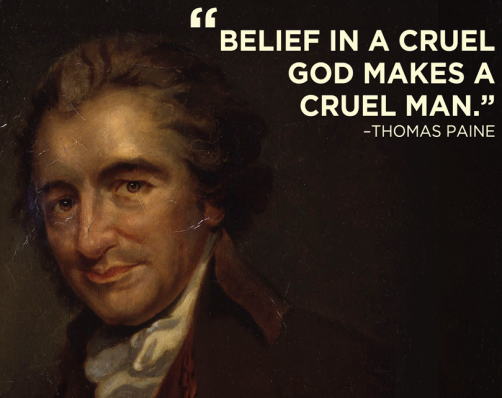
When people say such things as “Why would God let (X) happen?” or when they look at some corrupt priests or hypocritical “believers” and say “if they are people of God I do not want to be like them”, these people are having issues not with God at all, but with the interpretations of what God is, and the people who believe in that God. If you were to tell such non-believers that God never demanded any such things, or that it is not religion that is responsible for corrupt priests, but rather human free will is the cause, then I think the amount of atheists in the world would shrink dramatically. Problems with God are never really, I have found, problems with the idea of God or a Creator, but rather problems with doctrines levied and lobbied for as being in line with God’s wishes. This is what happens when you mix God and politics, since early times a known path to victory. In actuality, God gives Man, through freedom of choice, the ultimate rule over himself. The responsibility for evil falls predominantly onto Man.
The problem, put a different way, is that since at least 3000 BC Man has found it necessary to put into God’s mouth all kinds of words, and into his actions, all kinds of deeds, without knowing a lick whether such things be true or not. 5000 years later, we have so filled the books – purportedly containing God’s words – with line after line of often prejudiced, often ignorant, often self-serving and nearly always speculative human guesses, and have tried, and continue to try, to pass the lot on as “what God wants”. Many, seeing through the charade, thereby justify their rejection of any deity, and so become the otherwise inconceivable atheist. For, really, how can one sow one seed, or create and raise one child, and not bend down – or perhaps look up – in respect to all the truly God-like miraculousness evident everywhere. This awe is natural, and with it comes the idea of the Power responsible for inspiring it, and all this by Nature. Culturally, scientifically, however, we give other names to describe this awesomeness, to what is really our desire for Beauty and the quest for Love implicit in most hearts. Cupid, Eros, and Venus drive us on.
So, by human beings doing things in the name of God, and claiming they know, whether by revelation or Divine Right, what it is God wants, we have the Holy Books that are the cause of most of the religious trouble in the world. The God becomes OUR God, or the God of only the select. Now as then, what should be us when it comes to things Godly becomes instead us and them.
Does a good human father prefer one of his children over another? Does a good father ask his children to just stay home and stare at him all day, bestowing praises upon him? Would a good father tempt his child with all sorts of sumptuous delicacies and even bacchanalian opportunities if he intended they not be enjoyed? Which father does not want to see his children treated fairly, or see his children without having fun, or expect celibacy, and total obedience? Perhaps the parable of the Prodigal Son has a lesson for us in these regards.
Parable of the Prodigal Son
Jesus said: “There was a man who had two sons. The younger one said to his father, ‘Father, give me my share of the estate.’ So he divided his property between them.
Not long after that, the younger son got together all he had, set off for a distant country and there squandered his wealth in wild living. After he had spent everything, there was a severe famine in that whole country, and he began to be in need. So he went and hired himself out to a citizen of that country, who sent him to his fields to feed pigs. He longed to fill his stomach with the pods that the pigs were eating, but no one gave him anything.
When he came to his senses, he said, “How many of my father’s hired men have food to spare, and here I am starving to death! I will set out and go back to my father and say to him: Father, I have sinned against heaven and against you. I am no longer worthy to be called your son; make me like one of your hired men.” So he got up and went to his father.
But while he was still a long way off, his father saw him and was filled with compassion for him; he ran to his son, threw his arms around him and kissed him.
The son said to him, “Father, I have sinned against heaven and against you. I am no longer worthy to be called your son.”The father said to his servants, “Quick! Bring the best robe and put it on him. Put a ring on his finger and sandals on his feet. Bring the fattened calf and kill it. Let’s have a feast and celebrate. For this son of mine was dead and is alive again; he was lost and is found.” So they began to celebrate.
Meanwhile, the older son was in the field. When he came near the house, he heard music and dancing. So he called one of the servants and asked him what was going on. “Your brother has come,” he replied, “and your father has killed the fattened calf because he has him back safe and sound.”
The older brother became angry and refused to go in. So his father went out and pleaded with him. But he answered his father, “Look! All these years I’ve been slaving for you and never disobeyed your orders. Yet you never gave me even a young goat so I could celebrate with my friends. But when this son of yours who has squandered your property with prostitutes comes home, you kill the fattened calf for him!”
“My son,” the father said, “you are always with me, and everything I have is yours. But we had to celebrate and be glad, because this brother of yours was dead and is alive again; he was lost and is found.” [Luke 15:11-32].
No, this, what the Hebrews say, what the Christians say, what the Buddhists and Hindus and Muslims and polytheists say, is not God. True, each and every one of these religions, and their spin-offs, contain within them the germs of real God and true morality, known by the heart in every sane living soul paying attention. False they are the only, or even the correct paths to God. These organized religions are merely attempts at codifying morality, communicating via GPS what is already known and written on the map of the heart and weaved into the fabric of the soul.
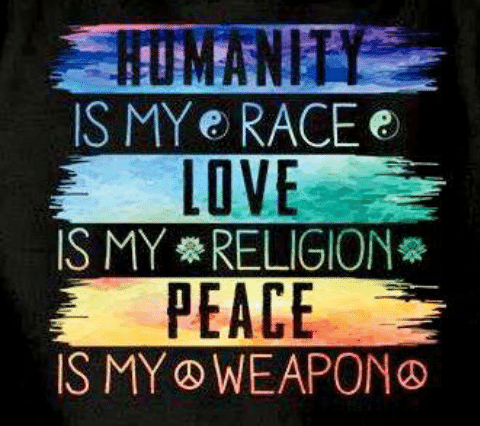
Toward A New Religion
Such a prospect as heads this section should not be misconstrued. I am not calling for a new religion in the sense of being just another ism like the plethora we already have. New religion must be non-denominational in every way, not aligned with a time or place or even specific group of beliefs. It must be merely simple acknowledgement that God is everywhere, knows everything, and can do anything. We are, moreover, always being watched, and never really alone. Keep in mind that everyone will die from this Earth, and what you have is a very simple religion with only one rule, one that says treat everyone as you want to be treated and do what you expect others to do.
Ethics is about fairness and justice. Justice is about fairness. Aesthetics is not prudish but not demeaning or unnecessarily depressing. Knowledge is about facts and not about number of adherents or popularity or mob rule. Politics is about who the best is, who is most capable of doing the job of leading. Prayer is about giving thanks, and accepting the rest stoically, as necessary to the progression and general course of things. Prayer for things is to be seen as unnecessary, since God knows what you need already. God is existential, and can appear in your mind for reference in colorful robes or plain white, as even how God Himself is made to look He leaves entirely up to you.

Ultimately, as all of it may be, it is your decision. It could be this personal responsibility itself that has kept too many from discovering the reality, indeed necessity of God. The decision to believe or not is also one God leaves to you, this trust being perhaps the biggest reason of all to accept not only His existence, but his goodness. What is Right and Good is written on the souls of men, and once this Book Of Life is discovered there is no choice but to stand in awe at the miraculousness of that revelation, a true realization of the amount of power and knowledge that must be exhibited to imagine, bring forth, and maintain the universe.
It is true that, through bad parenting, a misdirected society, shoddy schooling, mass media, the deification of money, and lack of real ethical learning, this inner knowledge has too often, in too many individuals, become suppressed, or ignored, or even buried. Any new religion must seek to, first and foremost, unearth this innate knowledge from those who have long buried it, and to foster it in the present and in all the coming generations. We must learn to listen to the small voice inside. Conflicts between what one knows inwardly with what one is told or taught from outside have always, and will continue to cause stress and anxieties, and concerning these latter perhaps mental problems and anguish have never been more epidemic in scope that they are right now in the world. It has reached the point where many don’t even bother looking inward at all, maybe from having been beat down by society at every attempt to go by those ideas, by following those instincts, by showing some guts. Guts, really, is what it’s all about. Having the fortitude, making the effort to be righteous, to be religious, without the old religions having one’s back. This is the stuff out of which any new religion must be made.
